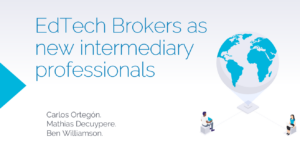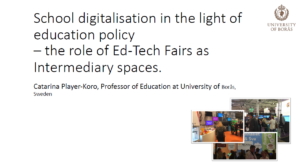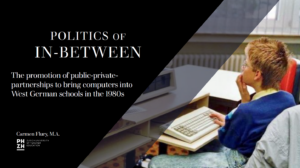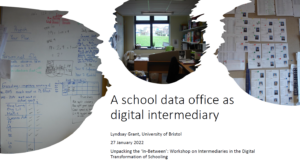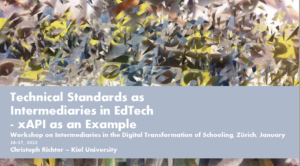A Workshop on Intermediaries in the Digital Transformation of Schooling
The international workshop took place from January 26-27, 2022, organized by Michael Geiss (PH Zürich), Sigrid Hartong (HSU Hamburg) and Tobias Röhl (PH Zürich).
On this page, you can find the workshop summary, the speakers and access the presentations. We enjoyed the workshop and hope the presentations can give an insight into the different perspectives provided by the great speakers. We want to thank everyone involved for their contributions and allowing us to share the presentations.
We are happy to announce that there will be a Special Issue on Intermediaries in the Digitization of Schooling, developed from this workshop, published in Research in Education in 2023.
Speakers
Carmen Flury (PH Zurich)
Historical Perspective on Intermediaries in Educational Technologization
Catarina Player-Koro (Goeteborg)
Tech Fairs as an Intermediary Spaces of Digitizing Schools
Carlos Ortegón (KU Leuven/Edinburgh), Mathias Decuypere (KU Leuven), and Ben Williamson (Edinburgh)
EdTech Brokers as New Intermediary Professionals
Lyndsay Grant (Bristol)
Data Offices as Digital Intermediaries in Schools
Christoph Richter (Kiel)
Technical Standards as Intermediaries in EdTech – xAPI as an Example
Collective Session:
Mapping the „In-Between“ of Digitizing Education Planning of Next Steps
Access the presentations here:
Workshop Summary
Despite a rising body of research on the digital transformation of schooling, public discourse often still conceive of the integration of educational technologies into classrooms as a straightforward or linear process. However, such a perspective neglects the large variety of mediators or intermediaries involved in this process, including their important roles in shaping how digital approaches manifest themselves in classroom settings (Williamson 2015, Hartong 2016). Such intermediaries include human actors, among them technology providers or EdTech brokers (e.g., Beer 2017, Williamson 2016), as well as non-human actors such as digital/data infrastructures, platforms, documents or sites (e.g., Sellar 2015, Decuypere et al. 2021, Selwyn 2014, Gulson/Witzenberger 2020).
Even though the scholarly attention for the ‚in-betweens‘ of digital education is growing, the function of intermediaries as an interrelated, continuously transforming field of its own still remains to be mapped. With this workshop, we want to address this gap by bringing together cutting-edge European researchers– qualitatively and quantitatively oriented, present-day and historically oriented –, exploring how digital technologies are ‘brought into’ schools. We invite scholars with different approaches and perspectives on intermediaries to participate in this workshop. Further, we are interested in contributions that focus not only on the classroom level and/or on the digital transformation of teaching practices, but also on the broader environment of digital schooling. This includes, for example, technology used in children´s homes. Another example is school technology used for communicating with parents or for administrative reasons, including the preparation of lessons, the creation of assign-ments and schedules, registration, or reporting. Finally, providers of educational technology use various ‘intermediary sites’ (e.g. trade shows) to advertise their products and recruit potential schools as customers. Indeed, we argue that such a variety of approaches is needed to understand both the multidimensionality and the common logics of the ‘in-between’ in the digital transformation of schooling.
Literature
Beer, D. (2017). The data analytics industry and the promises of real-time knowing: perpetuating and deploying a rationality of speed. Journal of Cultural Economy, 10(1), 21-33.
Decuypere, M., Grimaldi, E., & Landri, P. (2021). Introduction: Critical studies of digital education platforms.
Gulson, K. N., & Witzenberger, K. (2020). Repackaging authority: artificial intelligence, automated governance and education trade shows. Journal of Education Policy, 1-16.
Hartong, S. (2016). Between assessments, digital technologies and big data: The growing influence of ‘hidden’data mediators in education. European Educational Research Journal, 15(5), 523-536.
Sellar, S. (2015). Data infrastructure: A review of expanding accountability systems and large-scale assessments in education. Discourse: Studies in the Cultural Politics of Education, 36(5), 765-777.
Selwyn, N. (2015). Data entry: Towards the critical study of digital data and education. Learning, Media and Technology, 40(1), 64-82.
Williamson, B. (2015). Governing software: Networks, databases and algorithmic power in the digital governance of public education. Learning, Media and Technology, 40(1), 83-105.
Williamson, B. (2016). Boundary brokers: Mobile policy networks, database pedagogies, and algorithmic governance in education. In Research, boundaries, and policy in networked learning (pp. 41-57). Springer, Cham.
Letzte Änderung: 22. Mai 2022
